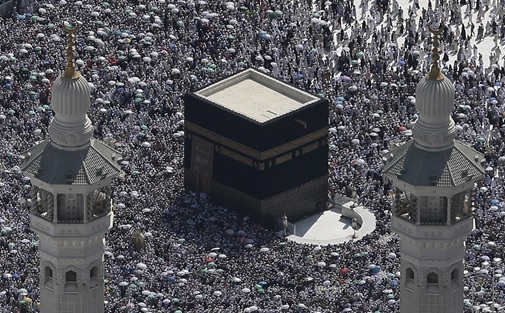By WardheerNews Editorial

“In it are Signs Manifest; (for example), the Station of Abraham; whoever enters it attains security; Pilgrimage thereto is a duty men owe to Allah,- those who can afford the journey; but if any deny faith, Allah stands not in need of any of His creatures” Surat Imran.
Performing the Hajj, is the fifth pillar of Islam
Performing the Hajj, is the fifth pillar of Islam. Hajj means the pilgrimage to Mecca; it is compulsory upon all Muslims who are financially capable and healthy enough to endure the physically commanding circumstance of the hajj. Hajj takes place in the 12 Month of the lunar calendar year, which is approximately two months and ten days after the holly month of Ramadan
The Rites of Hajj
Every Muslim who performs the hajj must complete four important rituals:
1) Pilgrim must enter the state of ihram and put on ihram clothing.
2) To perform the circling of the Ka’abah,
3) To make the stand at Arafat(wuquf).
4) To circle the Ka’abah again after the return from Arafat,
After a person performs all these rituals in order, one can earn the title hajji (hajji’ah for a female)
Background
The historical significance of hajj and the rituals the pilgrims perform while at the holly site, dates back to some major important factors that have transpired in the earliest days of Islam.
The Ka’bah Tawaf
The Ka’abah was first built by Prophet Adam (pbuh) for his gratitude to Allah (swt) and later reconstructed by profit Ibrahim and his son Ismail (pbuh). It is the first shrine of worship on earth, in which Muslims turn in prayer five times a day. When pilgrims first arrive at the Ka’abah, they are required to encircle it seven times in an anticlockwise direction.
Many of the pilgrims strive to touch or kiss the Hajur al aswad (the black stone). This may not be possible for all and so many pilgrims salute the rock from a distance. It sits on one corner of the Ka’abah and is said to have been sent from heaven. Sai is the ritual of running or walking briskly seven times between the two small hills of Safa and Marwa. The ritual commemorates when Hagar desperately sought water for Ismail when Ibrahim (pbuh) left them at the Ka’abah. This is the spot where baby Ismail’s feet dug out spring of Zamzam water with his little feet.
On the eight-day of Dul Hijjah, the pilgrims take a full bath and put on ihram again to proceed to the valley of Mina about 10 kilometers away.
Mount Arafat
The father of mankind, prophet Adam and Eve may peace be upon them were reunited on the plain of Arafat where there is a small hill, known as the mount of mercy, after Allah (swt) has forgiven their sins and after they had gone through the test and hardship of the dunya. Muslims believe that standing on mount Arafat on the ninth day of Dul Hijjah brings a pilgrim a total forgiveness of all past sins enabling life to begin as new. This is called the Wuquf. This is the most important part of the hajj. This is where the pilgrims stand in front of Allah and pray for forgiveness in the sweltering heat. For the pilgrim this brings a feeling of great release and a sense of total cleansing where an utmost emotional power is felt. By sunset the pilgrims head back to Muzdalifah between Arafat and Minah. This is where they collect their pebbles.
Ibrahim Al Khalil
Prophet Ibrahim known as the friend of God (Khaliil), has devoted his whole life to Allah, vowing to sacrifice everything to please Allah. Ibrahim (pbuh) was a humble devout prophet. He lived with his childless wife Sarah, and a second wife of Egyptian origin called Hagar. She gave birth to prophet Ismail (pbuh). The famous sacrifice story in the Quran details Ibrahim’s dream that God had desired his son Ismail to be sacrificed. Once prophet Ibrahim informed his son of his intensions, prophet Ismail agreed that they should do whatever God wills on them.
This was a great test from Allah and both Ibrahim and Ismail resisted the Satan’s wicked ways to persuade Ibrahim not to sacrifice his only son. Satan also tried to persuade Hagar not to allow Ibrahim sacrifice her son. He tried to dissuade her from the sacrifice she also ignored Satan. This is where all three collected small pebbles to cast against Satan to drive him away. There are three pillars at jumrahs where small pebbles are hurled at each. Here the pilgrims rededicate themselves to Allah, promising to cast devil away from themselves as best as they can.
To commemorate Ibrahim’s devotion to Allah (swt) to sacrifice Ismail where Allah (swt) has substituted a ram instead, the pilgrims who can afford on the tenth day of Hajj sacrifice a sheep or a goat.
In this day and age where the Muslim population around the world is staggering and where many Muslims desire to perform hajj as a duty, it is recommended that those that have already performed it once to allow first timers to do the same. In other words, performing hajj more than once is not necessary instead one can do umrah. If a pilgrim has gotten himself ready to perform the hajj and has been saving for it for a while, but an emergency occurs where the funds for the hajj are donated to some needy person, Allah (swt) counts the hajj for that person since hajj is mostly about niyah.
WardheerNews


Leave a Reply